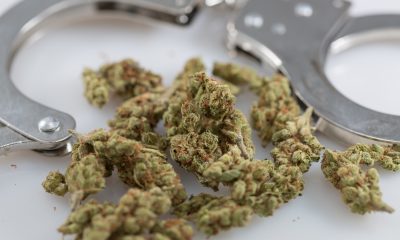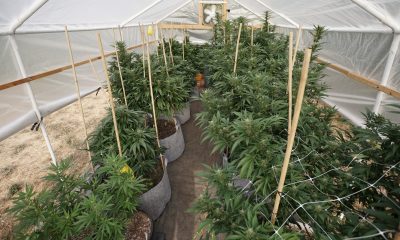Politics
California Lawmakers Revise Psilocybin Pilot Program Bill To Limit Eligibility For Participants And Facilitators

California lawmakers have revised a psilocybin pilot program bill to narrow eligibility criteria for participants and facilitators who could administer the psychedelic under the proposal.
About a week after Senate Minority Leader Brian Jones (R) and Sen. Josh Becker (D) unveiled the “Heal Our Heroes Act,” it’s been amended to make certain clarifications about who could take part in the project.
The legislation—which was introduced as an amendment to an unrelated Senate-passed bill that was on the Assembly floor at the time—would allow the counties of San Francisco, Santa Cruz and San Diego to establish pilot programs where military veterans and former first responders could receive psilocybin treatment with a licensed facilitator.
As filed, the measure said more broadly that “first responders” would have been eligible, without the “former” caveat. The legislation has also been updated to clarify that active duty military cannot participate.
The bill was also revised to limit who could qualify as a psilocybin facilitator. Only physicians and surgeons could administer the psychedelic under the current proposal, whereas it previously also included clinical psychologists, licensed clinical social workers, nurse practitioners, physician assistants, licensed professional clinical counselors or naturopathic doctors.
The bill calls for the pilot program to sunset after three years, with requirements to collect data and submit reports on the impact of the reform after two years. There are also provisions mandating certain safety standards such as screening participants to ensure that they can safely benefit from the psychedelic treatment.
Its introduction comes weeks after a Senate committee effectively killed a broader bill that would have legalized psychedelic service centers where adults 21 and older could have accessed psilocybin, MDMA, mescaline and DMT in a supervised environment with trained facilitators.
The new bill, which has been re-referred to the Assembly Health Committee, was also coauthored by Assemblymember Marie Waldron (R), who is also sponsoring a separate psychedelics bill focused on promoting research and creating a framework for the possibility of regulated therapeutic access that has already moved through the Assembly this year with unanimous support.
Advocates remain disappointed, however, that a broader psychedelics measure from Sen. Scott Wiener (D) stalled out during its final Senate committee stop last month.
It had been drafted in a way that was meant to be responsive to concerns voiced by Gov. Gavin Newsom (D) last year when he vetoed a broader proposal that included provisions to legalize low-level possession of substances such as psilocybin.
Instead, the revised bill would have provided regulated access to psychedelics in a facilitated setting, without removing criminal penalties for possession outside of that context. It did not lay out any specific qualifying medical conditions that a person would need to have in order to access the services.
—
Marijuana Moment is tracking more than 1,500 cannabis, psychedelics and drug policy bills in state legislatures and Congress this year. Patreon supporters pledging at least $25/month get access to our interactive maps, charts and hearing calendar so they don’t miss any developments.
![]()
Learn more about our marijuana bill tracker and become a supporter on Patreon to get access.
—
Separately, a California campaign to put psilocybin legalization on the state’s November ballot recently announced that it did not secure enough signature to qualify in time for a deadline.
Another campaign filed and then abruptly withdrew an initiative to create a $5 billion state agency tasked with funding and promoting psychedelics research last year.
A third campaign also entered the mix late last year, proposing to legalize the possession and cultivation of substances like psilocybin, LSD, MDMA, DMT, ibogaine and mescaline. People could buy them for therapeutic use with a doctor’s recommendation. Advocates for that measure still have time to gather and turn in signatures.
The California Legislative Analyst’s Office (LAO) has since released its review of that proposal, outlining not only the plan’s policy implications but also its potential fiscal impacts on the state—which the report calls “various” and “uncertain.”
Some California municipalities, meanwhile, are pushing forward with reform on the local level. The city of Eureka, for example, adopted a resolution in October to decriminalize psychedelic plants and fungi and make enforcement of laws against personal use, cultivation and possession a low priority for police. It’s at least the fifth local jurisdiction in the state to embrace the policy change. Others include San Francisco, Oakland, Santa Cruz and Arcata.
















